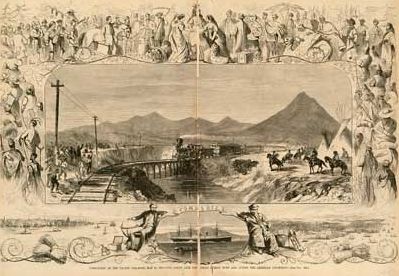The war does not stop the growth of the United States. Western railroad expansion continues, empowered by the Pacific Railroad Act enacted on July 1. The Act grants land and loans to railroad companies in order to connect the Midwest with California by rail.
The westward march of the railroad is now underway, employing thousands of northerners. Today, one railroad laborer writes home from his current encampment in Blakesburgh, Iowa, commenting on the rails, the war, and his visit to a small Baptist church in the Midwest.
16th August 1862
Dearest Jennie
Another week of hard labor has past since I last wrote to you but it has not been as hot as the [next city over]. We have gotten along very comfortably. Last Friday I received a letter from you and was very glad to hear that you were all so well. I hope that Anne is before this quite well again from her attack she must suffer much from the hives. I have had something like them and it seems as though I could get no relief until the past cool days.
I have go [sic] over one quarter of the distance to be located and I suppose over the most difficult [portions]. I shall be glad when I [will get] time to see you all at home once more. The war spirit runs high here. Old men and young lads are enrolling themselves by hundreds in all parts of the country. I think there is no fear of a draft in Iowa for the last requisition of 300,000. But should [?] I don’t know about the result but suppose there will be no difficulty about getting all the men the government requires or can find the means to cloth feed and pay. I see by an old Chicago paper that the [simri] spirit seems to prevade [sic] Illinois. I hope there will be no necessity for drafting in either state. From your letter I learn that Mr. Gilbert has gone I suppose to [Lake Lerf]. If he wants to see [hard] servis [sic] he had better come and join my party. I think a few weeks servis [sic] with me would do him more good then as many months travels on the lakes. I wish I had proposed to him to do so before I started from Joliet.
I am going to hear a babtist [sic] clergyman from Mo/Kansas and will lay this aside until I return and perhaps I shall have something worth writing about. I have been to church and if I did not think it wicked to laugh at and write about the peculiarities of some people’s worship I should feel like doing it now. The building is of very humble pretensions and seated in a very primitive manner. The dish is elevated and made of walnut. The seats for the congregation are logs of wood about 10 feet long split once [into] and laid across two other logs laid lengthwise of the building to rais [sic] the seats to a proper height all of which are as they grew in the woods not embelished [sic] in the least, and the congregation minister and all appeared very like the church.
The [mun] where we have been boarding for the past few days was formerly from Canada and well acquainted with our friends and relatives there the Hurds, Burnetts, and Boltoms, and was church people until they came west[?] is no servis [sic] .
I wish I could see you before the close of this sorry but don’t expect I can get away as there is no one to take my place and it will not do to stop the party while I could go to Joliet and back, but as soon as I get through the field work I shall before commencing the office work run up for a few days. And if I can get a family pass will do so. I think I can.
About the corn you and Charles must do as you think best perhaps it would do to sell the crib of old corn if there will be enough new to feed for the year. By the way wheat is the prospects for the growing of [ of corn there it is good in Joliet] but wheat and oats almost a failure.
I must now say good by [sic] to all and dear Jennie you know how lonely it is here without friends and family and do write often a letter from you is a bright spot in my dreary [party]. Kiss our children for me.
Yours very [affectionately,]
Samuel B. Reed
Sources: Pacific Railroad Act (link); Samuel B. Reed letter, August 16, 1862, University of Nebraska Lincoln (link); image (link)



